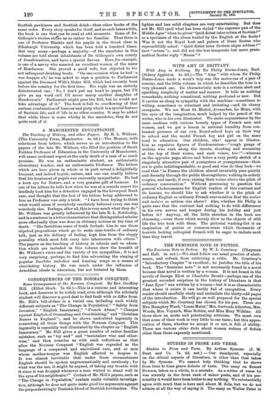The Feminine Note in Fiction. By W. L. Courtney. (Chapman
and Hall. 6s. net.)—We shall follow our usual practice of absti- nence, and refrain from criticising a critic. Mr. Courtney's "Introductory Chapter" is excellent; he justifies the title of his book. The "feminine note" is not necessarily found in a novel because that novel is written by a woman. It is not found in the novels of George Eliot or Charlotte Bronta—perhaps one of the greatest recorded surprises in the history of literature is that " Jane Eyre " was written by a woman—but it is so characteristic that where it exists it can hardly fail of recognition. Every reader should carefully study and assimilate the thirty-odd pages of the introduction. He will go on well prepared for the special subjects which Mr. Courtney has chosen for his pen. These are Mrs. Humphry Ward, " Lucas Malet," Mrs. Gertrude Atherton, Mrs. Woods, Mrs. Voynich, Miss Robins, and Miss Mary Wilkins. All these show an acute and penetrating criticism. We must own that some of their work is very little to our taste ; but this appro.,_ ciation of them, whether we accept it or not, is full of ability. There are various obiter dicta about women writers of fiction other than these expressly mentioned.
STUDIES IN PROSE AND VERSE.






















































 Previous page
Previous page